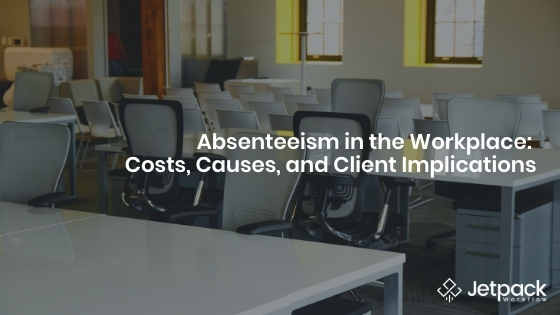Absenteeism in the Workplace: Costs, Causes, and Client Implications

Think back to when you were an employee at a company and had to be absent from work. There are many reasons why an employee will need to call off or schedule vacation or other forms of absences; however, they’re not always easy to spot as a business owner.
When you started your firm, you should’ve fully expected to have long days and work into your weekends. And for a while, that’s the nature of starting your own company. One day you’re landing a high-value retainer client, and the next you’re troubleshooting your invoicing software.
Then, you hit an inflection point. You needed help, so you expanded your team. You probably remember your first hire and the energizing days of training them on your personal mission. As you grew and added more team members – and possibly layers of management – you were thrilled to be able to focus on landing new clients and working on strategic projects.
But then you’ve started to notice that recurring work isn’t getting done on time, or bread-and-butter services aren’t working either internally or externally. Did you grow too big, too fast?
The issues can range from workflow or productivity issues, new hires, miscommunication, or even a matter of employee motivation. Let’s dive into all things absenteeism from work.
Why Employee Attendance is Critical to Your Growth Goals
Nothing slows down a workflow faster than if the task owner is out of the office. It’s a bottom-line killer, too. Sometimes it’s OK to move the task forward by a day or two; however, sometimes it’s a critical deliverable for your client. No business owner wants to receive that escalated call or email.
Employee absences cost businesses time and money.
An average small-to-medium sized business loses $3,600 per year for hourly employees and $2,660 for salaried employees due to unexpected absences each year. In addition to money lost, there is a loss in hours and productivity to consider when work shifts to another team member.
Workplace productivity is our favorite thing. We’ve talked to thousands of firm owners, and the ability to deliver quality work on-time and without a hiccup is one of the top reasons accounting firms trust Jetpack Workflow. Our software has an easy tool built-in to mass-edit tasks when an employee is absent. Easily bulk reassign or change due dates on the employee’s assigned tasks, so you can get back to your day.
Employee engagement helps attract and retain top talent.
If you build a company in which people want to work, you will attract and keep top talent. It’s very simple in theory, but difficult to accomplish when you’re working on client deliverables, managing employees, and ensuring your lights stay on. So your business processes and standard operating procedures must be tight.
Happy employees mean happy clients.
When you delegate client work to team members, you’re trusting them to keep your clients happy and maintain service level standards. When employees do not have the tools they need to do their work or feel taken care of by you as their employer, the work will suffer and client happiness will decline. Teamwork makes the dream work.
Learn to Spot the Signs: Types of Absences
There are a few different types of absences at work that are important to distinguish. This will help you ask employees deeper questions about the root causes of their absences, rather than watching the clock or tracking their time off in a spreadsheet (or worse, their permanent record).
Here are a few of these main types of absences and what they could mean to you as an employer:
Changes in Frequency of Call-Offs
This one is easy to spot and identify. Last-minute illnesses or other issues do come up naturally, and that’s to be expected as any manager. But what you need to focus on is a change in frequency. This can be a symptom of something that is causing the employee to not be at the top of their game.
Long Weekends vs. Traditional Vacations
If you notice workers opting to take long weekends instead of a full week of vacation at a time, that’s not always a red flag. But you should still notice it. Sometimes this can be an employee scheduling time-off at peak days for deadlines (Fridays) or new work (Mondays). Job interviews can also take place on those days more than others.
Partial Work Shifts
This trend is related to taking long weekends instead of vacations. Maybe an employee is taking partial days to interview for a new job or to avoid certain tasks or recurring client calls. Doctor and other healthcare appointments could cause this, and that’s to be expected for any worker. But a chronic trend of partial work shifts still hurt your team’s productivity and your bottom line.
Top Causes of Chronic Absenteeism in the Workplace
Once you know what types of absenteeism your employees are exhibiting, you’ll need to drill down into the causes to help steer your team back on course. These aren’t easy conversations to have, but you’ll have a more productive and impactful conversation if you try to understand the cause behind the type of work absences.
Cause #1: Toxic Work Environment
You know the kind of work environment we’re talking about here. Maybe you had your own experience with a toxic workplace (or multiple experiences), and that led you to start your firm in the first place?
Cause #2: Personal and Family Issues
Life happens, right?

When an employee has typical problems at home, it can cause absenteeism at work. These issues can range anywhere from child care, caretaking for elderly relatives, access to remote working or transportation, home and car repairs, and other basic life necessities.
As a business owner, you need to plan for life’s inevitable inconveniences and hurdles when it comes to your employees. A robust PTO policy and FMLA can do a lot to mitigate the majority of these problems, but if there’s still a trend in your firm for personal-related call-offs, there’s something else at the root of the problem you need to address.
Cause #3: Health Issues
People get sick. It’s easy to spot a cold, and the flu season is notorious for holding employees hostage in their beds. But there are other health issues that could cause an employee to be frequently calling off work, such as:
- Mental health, such as depression or anxiety
- Chronic health conditions
- Pregnancy or infertility
- Caretaking for children, spouses, or immediate/close family members
Cause #4: Frustrating Employee Experience
Your brand as an employer is important because it impacts everything your team is able to do from client services, billable work, and your ability to grow. When employees experience frustration in the workplace due to technical IT issues, HR policies, and how work is completed, it can demotivate employees and cause an increase in work absences.
Employee Absenteeism Solved with a Workflow Software
It can be difficult to picture yourself living your best life working from an island or jet setting across Europe when you’re faced with chronic absences from your employees. In addition to high-quality training and standard operating procedures for employees, a workflow software tool can help you still get the job done for your clients when there’s a call-off. (And you don’t have to do it yourself, either.)
Try Jetpack Workflow for free for 14 days so you have more time to spend on growing your firm and taking that next vacation, or even take an absence from work yourself.





